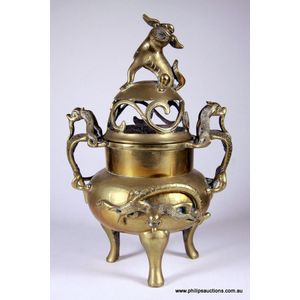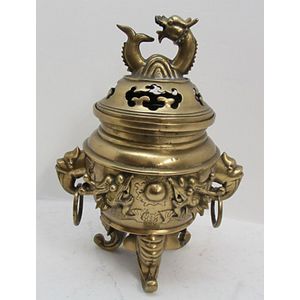Chinese Bronze Censer with Chilong Handles and Ruyi Motif
You must be a subscriber, and be logged in to view price and dealer details.
Subscribe Now to view actual auction price for this item
When you subscribe, you have the option of setting the currency in which to display prices to $Au, $US, $NZ or Stg.
- Bronze - An alloy of copper and tin, traditionally in the proportions of about 9 parts of copper to 1 part of tin.
The discovery of bronze in Western Asia in the 4th century enabled people to create metal objects which were superior to those previoulsy possible because of its strength and hardness, and it has been used throughout the world for weapons, coins, tools, statuary and other decorative items.
It is very fluid in a molten state, and its hardness, strength when set, and non-corrosive properties makes it most suitable for casting sculpture. - Zoomorphic - Objects made having the shape, form, or likeness of an animal. For example, the Hindu god Ganesha has the head of an elephant.
The term is also applied to furniture made from animal parts. Examples are chandeliers, hallstands and chairs made from deer antlers and umbrella stands, ice buckets and other objects made from an elephant's foot. - Oviform /ovoid - The outline loosely resembling the shape of an egg.
- Finial - An architectural decoration, found on the upper parts of of an object. On furniture they are usually found on pediments, canopies and shelf supports. On smaller ceramic or silver items, such as spoons, they may decorate the top of the item itself, or the lid or cover where they provide a useful handle for removal.
Finials have a variety of shapes and forms. They may be urn-shaped, baluster shaped round or spiral, but usually taper into an upper point. Many real life shapes may also be used as finials, such as pineapples, berries, pinecones, buds, lotus and acorns. Sometimes animals such as a lion are depicted, or fish and dolphins. - Foo Dogs - Foo Dogs, also known as "Fo Dogs", "Fu Dogs", and " Buddhist lions" are the Chinese guardian lions that have traditionally stood in front of Chinese Imperial palaces and tombs, government offices, and the homes of the influential are believed to have powerful mythic protective benefits.
They are a popular motif in decorative arts, especially ceramics and garden statuary, where they are depicted in pairs, comprising of a male resting his paw upon an embroidered ball, representing supremacy over the world, and a female restraining a playful cub, representing the nurturing properties of the female.
This item has been included into following indexes:
Visually similar items

A Chinese bronze covered censer, Republic Era, mid 20th century, the compressed cauldron style pot raised on three shaped legs with a wide collar and pierced dome lid with a lion dog finial, with bearded dragon handles and applied fantastic creatures to th

An oriental brass incense burner. 41 cm high

A Chinese cloisonne enamel gilt bronze three footed censer with four character mark to base, height 49.5 cm

A Victorian silver tea and coffee set, the four piece set with ornate Rococo decoration, bird finial to coffee and tea pots, ivory heat rings, the teapot by Robert Hennell III, London 1851, the cream and sugar by Robert Hennell III, London 1862, the coffee
